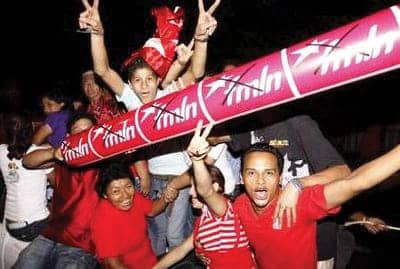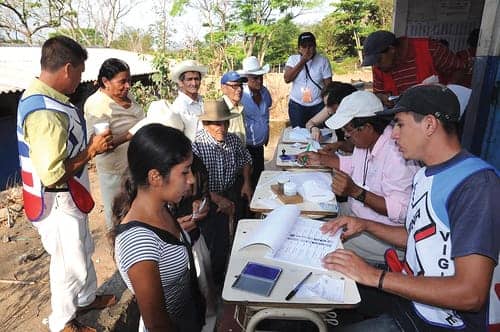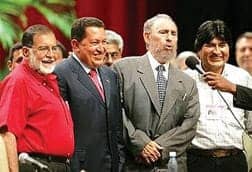
by Vijay Prashad
Twenty-nine years ago, on March 24, 1980, Archbishop Oscar Romero was gunned down as he offered mass in San Salvador. Just before the assassin fired into his heart, Romero read from the Bible, “Unless the grain of wheat falls to the earth and dies, it remains only a grain. But if it dies, it bears much fruit.” Romero fell on the altar, which was stained with his blood.
Reared in the comfortable Catholic hierarchy, Romero showed no signs of affiliation with the popular Liberation Theology or even with the moderate traditions of Vatican II liberalism. The gross state violence in the late 1970s moved him, and when his friend, the Jesuit priest Rutilio Grande, was murdered in 1977, Romero’s politics shifted to the left.
He spoke openly against the murders and starvations and pleaded with the church and military to give succor to the people of El Salvador. His sermons grew braver, as Romero himself grew more pious and humble. He moved into a three-room hermitage and associated with the homeless and the brutalized, saying, “To those who bear in their hands or in their conscience the burden of bloodshed, of outrages, of the victimized, innocent or guilty, but still victimized in their human dignity, I say: Be converted. You cannot find God on the path of torture. God is found on the way of justice, conversion and truth.”
I first heard of Oscar Romero in 1985 from members of CISPES, the Committee in Solidarity with the People of El Salvador. My college comrade, Noel Rodriquez, introduced us to them; he is currently a union organizer in California. Noel and the CISPES people brought us to La Placita, the popular name of the Iglesia Nuestra Señora Reina de Los Angeles. Here we encountered Father Luis Olivares, a brave priest who, in 1985, made his church into a sanctuary for Central American – mainly Salvadoran – refugees.
Olivares and CISPES were inspirational. They took on the U.S. government’s intimate involvement on behalf of the military and oligarchy in El Salvador, and they took on that nexus in El Salvador itself. For this, the activists were threatened by legal action by the FBI and received threats from the El Salvadoran death squads.
I remember the bravery of people like Yanira Corea, who was held by death squad bandits in a van not far from the LA CISPES office and who was tortured by them in that van, but yet refused to say anything. They let her go, saying, tell others “we are here.” CISPES remained undeterred. The stakes were too high.
Later, it became clear that Romero’s assassination had been ordered by Major Roberto D’Aubuisson, the man who in September 1981 founded the Alianza Republicana Nacionalista (ARENA). D’Aubuisson’s ARENA was the vehicle of the oligarchy, which had since the 1930s preferred to cede political power to the parties of the military, while they dominated the economic sphere. Fourteen families dominated the country for the bulk of the 20th century.
The Party of the Army allowed some rivals to come forth in their various elections, a process that enabled the country to seem more liberal than the neighboring dictatorships in Guatemala (1954-1996, with some breaks), Honduras (1963-1981) and Nicaragua (1936-1979). El Salvador’s oligarchy – deep into coffee – was united and economically less dependent on the United States than the neighboring Central American states.
From the 1930s to the 1970s, the oligarchy tolerated some liberal reforms made by the Party of the Army, whose lower orders pressured the generals to allow their relatives some breathing room – they even allowed the formation of trade unions and rural unions – but after 1979, the oligarchy exerted itself, using U.S. paranoia about the spread of communism and a temporary weakness in the military leadership.

An extra fraudulent election in 1977, the crackdown on progressive organizations, the emergence of death squads – such as FALANGE and the Unión Guerra Blanca or the White Warriors’ Union – and the squelching of the aspirations of a population given to hope over circumstances, brought events to a head. Romero’s assassination was a motivator: Various groups came together in united front efforts, and eventually to the formation, in October 1980, of an umbrella organization, the Farabundo Marti National Liberation Front (FMLN).
The FMLN drew in the Communist Party of El Salvador (the PCS), the Vietnam War-inspired Fuerzas Populares de Liberación Farabundo Marti (FPL) and others. Drawing from the FPL’s Salvador Cayetano Carpio’s 1972 call for a “prolonged people’s war,” the FMLN began its armed response to institutionalized state violence. El Salvador’s terrain is not suited to guerrilla warfare: There are few strategically useful mountains and few thick forests, and it bordered countries that were hostile to the FMLN. The Honduran military routinely killed FMLN partisans who slipped across the border.
It is a tribute to the organizational work of the peasant unions that the radicalized peasantry was willing to sustain the FMLN in the war that seemed never to end; it ran from 1980 to 1992. The FMLN held its ground but could not come close to state power – this largely because of the influx of U.S. military aid: $5.9 million in 1980 to $136.5 million in 1984 to a total of $6 billion in various kinds of assistance over the period, as well as of U.S. training for the Salvadoran special forces.
By 1982, the FMLN was contained in the countryside, as the U.S. oversaw an election between the right and the extreme right. ARENA, the party of the extreme right, won that election. ARENA could not adopt its platform, constrained as it was by the liberals and the right.
Conflicts within the FMLN, meanwhile, led to its own infractions: Fights over strategy led to its revision of its 1980 manifesto in 1984, the latter which muted its calls for socialism, upped its plea for human rights and offered a truce toward negotiations. This was a strategic necessity, lest the FMLN continue a bloody war with immense civilian casualties; and it was also a challenge to the oligarchy and to the United States.
ARENA lost the edge, as the Christian Democrats tried to tame a feral system, but in the end, the right could offer only the gun: 75,000 people lost their lives in the long decade of the civil war, with untold numbers of victims of torture and violence. The U.N.-sponsored Truth Commission reports that the FMLN was responsible for 5 percent of the deaths, while the armed forces and the paramilitary forces were responsible for 85 percent of the deaths; 10 percent is undetermined.
In 1989, the FMLN, in a final blast, took parts of San Salvador. It was futile. Two years later, the FMLN, the military and the oligarchy sat down to negotiate the end of the hostilities. A year later, in 1992, a U.N.-brokered peace treaty ended the war.
The FMLN emerged as a political party. ARENA had held the presidency since 1989, and it continued to win elections after the new constitution came into play, winning till this year. ARENA’s El Salvador became a close ally of the United States, voting with it in the United Nations and in the Organization of American States, sending its military into the various “coalitions of the willing,” including to Iraq, and being the first to sign up for CAFTA, the Central American Free Trade Agreement.
Neoliberalism came in fast and furiously, with the oligarchy and an emergent entrepreneurial section eager for a larger slice of the high commodity prices, particularly for coffee. Half the rural population lives in poverty. Economic inequalities in El Salvador soared: The overall poverty rate moved to over 40 percent. Between September 2007 and June 2008, an additional 100,000 people went below the poverty line – this in a country of 6.5 million.
Reliance upon exports of coffee and of remittances – 18 percent of GDP – from those who had fled during the civil war helped keep things in check. With the global financial crisis, El Salvador’s fundamentals plummeted. This showed up ARENA and gave the FMLN a decisive advantage.
For the election of 2009, the FMLN chose as its presidential candidate the young CNN journalist Mauricio Funes. The revolutionary credibility came from his vice presidential candidate, the guerrilla leader Salvador Sanchez Cerén. ARENA picked the less charismatic Rodrigo Avila, who had the misfortune of being a former director of the National Civil Police.
Funes’ greatest ally was a shift in the political landscape in El Salvador. During a CISPES gathering in Boston a few years ago, I shared the podium with FMLN leader Lorena Peña, who is a parliamentarian to the Central American parliament. Peña, in her decisive style, made the point that the Peace Accords of 1992, which she helped negotiate, gave the people of her country the right to act, to create political space. But the neoliberal reforms from ARENA had undermined these very spaces.
ARENA’s neoliberal policies, therefore, were on a direct track to collide with the aspirations opened up by the Peace Accords. A small gesture of this can be seen in the 2007 “Battle of Suchitoto,” where about 400 people disrupted the president’s attempt to privatize water delivery. The police went into riot mode, firing tear gas, beating people and arresting 14 on charges of terrorism.
The absurdity of the state beating its people on behalf of the privatization of water was not lost on the population. Funes came out against water privatization and on behalf of greater democratization of the commons and of politics. He stood on the side of the Peace Accords. Talking to two U.S. journalists on the night of the election, Funes made this clear:

The challenges before Funes’ government are enormous, but the FMLN is prepared. Funes decamped to Brazil to meet Lula – Funes is married to a Brazilian Worker’s Party member who was their representative in El Salvador – as his party spoke about ending the privileges of the few: taking on the 14 familes and the military. The red-turn in Latin America continues, as liberals and leftists now control governments from Guatemala to Argentina.
In 1932, Col. Marcelino Galdamez of the El Salvador army said: “Communism is like a tree shaken by the wind. The moving tree causes the seeds to fall; the same wind carries the seed to other places. The seed falls on fertile soil. To be done with Communism it is necessary to make the ground sterile.” The Party of the Army and ARENA failed to make El Salvador aseptic. The tree shook. The FMLN grew, and now takes over the Casa Presidencial.
Vijay Prashad is professor of international studies at Trinity College in Hartford, Conn., and the author of 11 books – most recently, “The Darker Nations: A People’s History of the Third World.” He can be reached at vijay.prashad@trincoll.edu. This story first appeared in Pragoti.





